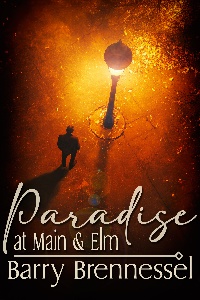Adrian Stockwell and Ezra Cherevin both battle the fallout from their broken families. Yet each one’s strategy is as different as each one’s past. Adrian’s childhood was left void by apathy; Ezra’s upended by violence. The written word soon becomes their therapy, their escape. This shared passion for literature is the vehicle that brings them together.
But their journey is filled with personal and familial potholes. Can these two young men carve out a life together by learning to navigate a sea of challenges? And can the people in their lives do the same?

Every few minutes the water gurgled. “Suppose there are fish in there?” Adrian asked.
“I’m sure there are,” Ezra said. “Poor things.”
They walked along the Erie Canal towpath a mile west of town, the moonlight fading in and out behind drifting clouds. Ezra carried the grease-stained bag holding their meatball subs and fries, and Adrian clutched their lemonade and a bag with extra napkins and packets of salt.
Adrian had envisioned a restaurant when Ezra said he had a place in mind. He never thought they’d be having a picnic in the desolate outskirts of town at nine thirty at night.
“She liked you,” Adrian said.
“Who?”
“The sub shop lady.”
“Sister of the owner. I told her they made the best meatballs I’ve ever tasted. It wasn’t a lie. She’s been my best friend ever since.”
“You eat there a lot?”
“Yep. Good. Cheap.”
“I’ve got a dining hall plan,” Adrian said. “They serve up trash can surprise with puke sauce.”
“For five times the price we paid for these.”
The water gurgled again. “You do eat balanced meals, don’t you?” Adrian asked. “Not meatballs every night?”
Instead of answering, Ezra cut to the left up a small hill. “Come on.”
Follow me. Follow me.
“Shit,” Ezra whispered. “Hold it, wait.”
“What?”
Ezra crouched down and pointed to a herd of deer, eight ... nine ... no, ten. They all froze, their heads moving up in a single, fluid, choreographed instant. “Fucking beautiful,” Ezra said.
Adrian crouched beside Ezra. Their arms touched. “Staring contest,” Adrian whispered.
“They’re in our dining spot,” Ezra said.
“Here?” Adrian looked over the terrain. It was clearly an orchard, but from what he could tell in the darkness, it hadn’t been worked in years. The first clues were several dead trees and the tall grass engulfing everything.
A buck bolted. Within seconds, the entire herd turned and raced away.
“Guess I offended them,” Ezra said. “I didn’t say they couldn’t stay.”
“Deer can sense rudeness.” He pushed his arm against Ezra’s.
“I hope you like it here,” Ezra said, standing up. “I had to show it to you.”
Adrian stood. “Why?”
“Nut. That first story you submitted to class? ‘Perennial’?”
Adrian smiled. “Oh, duh. The orchard scene.”
Ezra led them to where the deer had been standing. He turned and pointed. Adrian followed the direction of Ezra’s finger. They could see the canal below, and a rolling field down below that.
“The way you described the land,” Ezra said, “I’d swear you’d been here before.”
Adrian shook his head. “I haven’t.”
“This is the most serene spot,” Ezra said, sitting on the ground with his back against the trunk of an apple tree that appeared to be barely clinging to life. “The way I feel when I’m just sitting here, listening to the sounds. Or sometimes just not hearing them at all. It’s like you just totally got inside my head with that scene. It’s like you totally understood the necessity.”
Adrian walked over and sat down next to Ezra. He placed both lemonades on a patch of ground where the grass didn’t threaten to tip the containers over. He set the bag of napkins and salt packets on his leg. “You hang out here a lot?”
“I’ve fallen asleep here,” Ezra said, opening the bag and tilting it toward Adrian. “Take the biggest one.”
“They’re not equal?” Adrian asked.
“I think my girlfriend made mine a little bigger.”
“Discrimination,” Adrian said. “But you take the bigger one. It’s meant for you, anyway.”
“Nah, I insist. You have to taste these meatballs.”
The foil sparkled in the moonlight as Adrian unwrapped the sub. “Have you really fallen asleep here? At night?”
“Go on. Taste those meatballs. Aren’t they heaven?”
Adrian took a bite. “Mmm ... garlicky. Yeah. And the sauce. Not too sweet. The sauce is usually too sweet for me.”
“Cheese is tangy. Sprinkle some extra salt on these fries. This is like being above the banks of the Seine.”
Adrian laughed. “It totally takes a poet to turn meatball subs and the Erie Canal into Paris la nuit.”
“I’m no poet,” Ezra said. “I just write poetry.”
“You’re named for a poet. Have you ever read Pound?”
Ezra shook his head. “No. He was a fascist.”
“Oh my God. You’re not serious, are you?”
“You didn’t know that?”
“No. Wait. I knew that. But I mean you saying that isn’t any different from Mike Somba saying he won’t read any work by gay writers.”
“I know. I was only kidding.”
“Were you?”
“Of course I was,” Ezra said. “But that means you would have to read works by notorious homophobes and anti-Semites and --”
“Ugh. That’s not really a fair comparison.”
“Neither is fascism to being gay. Although some gays can be fascists. I don’t know. I’m losing track of all these minority groups versus loose associations and ... hell, most of them are probably closet cases anyway.”
“It doesn’t matter,” Adrian said. “There’s so much on my reading list that I probably wouldn’t get to them until I’m ninety. At that point, I’d like to think that all the world’s petty differences and prejudices will have dwindled. Ha ha. Right? Insert laughter here.”
The branches above them swayed. Their form of laughter? Adrian wondered.

